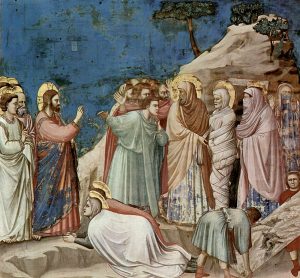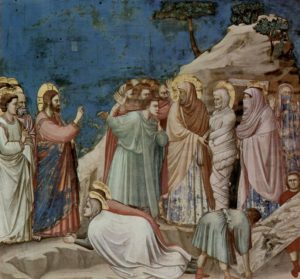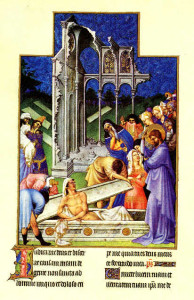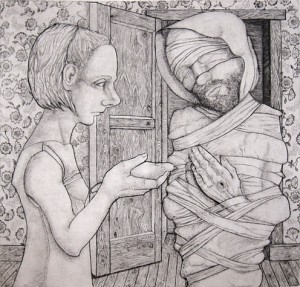Thoughts on the Lectionary readings for All Saints B, Nov. 1, 2024
The readings for All Saints Day may be moved to the following Sunday, Nov. 3, 2020.)

The Raising of Lazarus (1304-1306), fresco by Giotto di Bondone (c.1266-1337). Cappella degli Scrovegni nell’Arena, Padua, Italy. (Click image to enlarge.)
First Reading: Wisdom of Solomon 3:1-9
We are an Easter people. All of us go down to the dust; yet even at the grave we make our song: “Alleluia, alleluia, alleluia.” On All Saints Day, as when we bury our dead, we dress the altar not in the black of mourning but the white of hope and joy. We remember that we are dust, and to dust we shall return; yet we celebrate the communion of saints, the living and the dead, all bound together in Christ. These ideas all come together in the Lectionary readings for All Saints Day, beginning with Wisdom’s promise that peace, love and joy with God await God’s faithful people.
Alternate First Reading: Isaiah 25:6-9
On All Saints Day we dress our altar not in the black of mourning but the white of hope and joy. We remember that we are dust, and to dust we shall return. On this day we celebrate the communion of all the saints, the living and the dead, all bound together in Christ. These ideas are all knit together in today’s readings, beginning with the Prophet Isaiah’s vision of a banquet table that will welcome all the people of all the nations, a delicious feast of rich food and aged, clear wines for a people united at last in a kingdom “where sorrow and pain are no more, neither sighing, but life everlasting.” It is no coincidence that these verses are also often chosen for our burial liturgy.
Psalm: Psalm 24
The psalm designated for All Saints Day, like the first readings, celebrates the rewards for those who live as God would have us live. Originally it was an ancient liturgy, a responsive chant sung by priests and people as they approached the Temple for worship. The priest calls out, “Who can stand in his holy place?” The crowd roars back, “Those who have clean hands and pure hearts!” The priest responds, “Who is the king of glory?” “The Lord of hosts,” the crowd shouts back with joy.
Second Reading: Revelation 21:1-6a
Our second reading is also frequently read at funerals, as one of the readings used in the liturgy for celebration of a life. Continuing the All Saints Day theme of a glorious life after death for those who love God, it describes a holy city coming down out of heaven, a new Jerusalem. This shining city stands in stark contrast to the dark and demonic earthly city of Rome, portrayed in Revelation as Babylon. We hear that death and pain will be no more in this heavenly city, for God will be with us every day, wiping the tears from our eyes.
Gospel: John 11:32-44
Lazarus has died, and Jesus weeps. Jesus knew his friend was dead, so he took his time getting to Bethany, which angered Lazarus’s sisters, Mary and Martha. Maybe he could have done something, if only he had hurried. So often death in the family brings not only sadness but anger and rage. And then, whispering a quiet prayer to God, Jesus calls out and Lazarus answers. Jesus says “No” to the death of Lazarus, just as God will say “No” to death for Jesus and for us all on Easter Day. Death does not have the last word.



 First Reading:
First Reading: